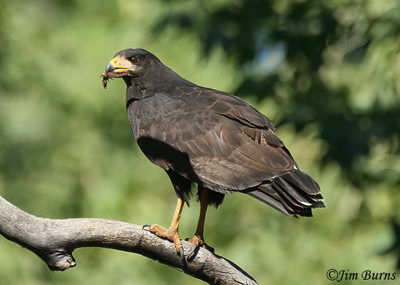
Recovering quickly as my mind wandered to wondering how this might have worked as a pick-up line in a college bar, I told her, to the contrary, I was neither an ornithologist nor a scientist of any kind, but simply a nature lover/bird enthusiast poking around with a camera. I think I also said something like she should be careful, in this age of science denial, who she might be calling a “scientist.” Then I thanked her for her observation and told her it was the nicest compliment I’ve had in years.
When we first came to Arizona forty-five years ago, there was a lot of angst amongst raptor biologists around the future of Black Hawks (yes, I’m dropping “common” and going with what I hope will be the future common name) here at the northern limit of their distribution. There was habitat loss, stream degradation, and a winter fungus was killing off Leopard Frogs, their favored prey. It was hoped they would learn to fish.
Not to worry, at least for the moment. They have adapted well since then and are now known to have a broad diet. Hunting these hawks with the camera over the years we have seen them most often splashing along creek beds foraging for aquatic prey like nothing so much as a Great Blue Heron or one of the egrets, and we have captured images of this decidedly “non-raptorish” predator with frogs, snakes, and aquatic crustaceans, the latter so often I now consider Black Hawks to be crayfish specialists.
When I mentioned this, my new scientist friend, who turned out to be a fisheries expert, asked if anyone in the group realized crayfish were an invasive species in Arizona, originally imported from the Southeast for use as bait and to help control grass and other vegetation in the state’s canals and irrigation ditches. I didn’t. Apparently with their voracious appetites they outcompete our native aquatic species for just about anything edible as they literally muddy the waters with their dredging the streambeds.
So, it would seem that our Black Hawks, with their historically recent foraging adaptations, are rectifying a rather typical environmental mistake by our species. Should this give us a grain of hope for the planet? Beats me, but I found it interesting that my observations led a real wildlife scientist to suggest that I was a scientist too. From there it seems not a great leap to acknowledge and appreciate that “citizen science” is a real thing, and that birders do have something to contribute to the planet’s survival whether they are helping with a Christmas Bird Count, posting on Ebird, or just observing and making a mental note of what they are witnessing.
It’s been a few years now since one of Trump’s minions floated the idea of alternate facts, an oxymoron if ever there was one. Scientific knowledge evolves as the world changes, but it evolves through curiosity and observation, passion and attention to detail, study and collaboration. These are traits all the people I know who call themselves birders have in common. Please feel free, the next time you lift your binoculars or snap an image, to think of yourself as a scientist.